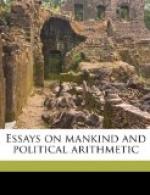10. As to the propagation and improvement of useful learning.
The same may be said concerning it as was above said concerning manufactures, and the arts of delight and ornaments; for in the great vast city there can be no so odd a conceit or design whereunto some assistance may not be found, which in the thin, scattered way of habitation may not be.
11. As for the increase of people by generation. I see no great difference from either of the two states, for the same may be hindered or promoted in either from the same causes.
12. As to the plague.
It is to be remembered that one time with another a plague happeneth in London once in twenty years, or thereabouts; for in the last hundred years, between the years 1582 and 1682, there have been five great plagues—viz., A.D. 1592, 1603, 1625, 1636, and 1665. And it is also to be remembered that the plagues of London do commonly kill one-fifth part of the inhabitants. Now if the whole people of England do double but in 360 years, then the annual increase of the same is but 20,000, and in twenty years 400,000. But if in the city of London there should be 2,000,000 of people (as there will be about sixty years hence), then the plague (killing one-fifth of them, namely, 400,000 once in twenty years) will destroy as many in one year as the whole nation can re-furnish in twenty; and consequently the people of the nation shall never increase. But if the people of London shall be above 4,000,000 (as in the first of our two extravagant suppositions is premised), then the people of the whole nation shall lessen above 20,000 per annum. So as if people be worth 70 pounds per head (as hath elsewhere been shown), then the said greatness of the city will be a damage to itself and the whole nation of 1,400,000 pounds per annum, and so pro rata for a greater or lesser number; wherefore to determine which of the two states is best—that is to say, towards which of the said two states authority should bend the present state, a just balance ought to be made between the disadvantages from the plague, with the advantages accruing from the other particulars above mentioned, unto which balance a more exact account of the people, and a better rule for the measure of its growth is necessary than what we have here given, or are yet able to lay down.




